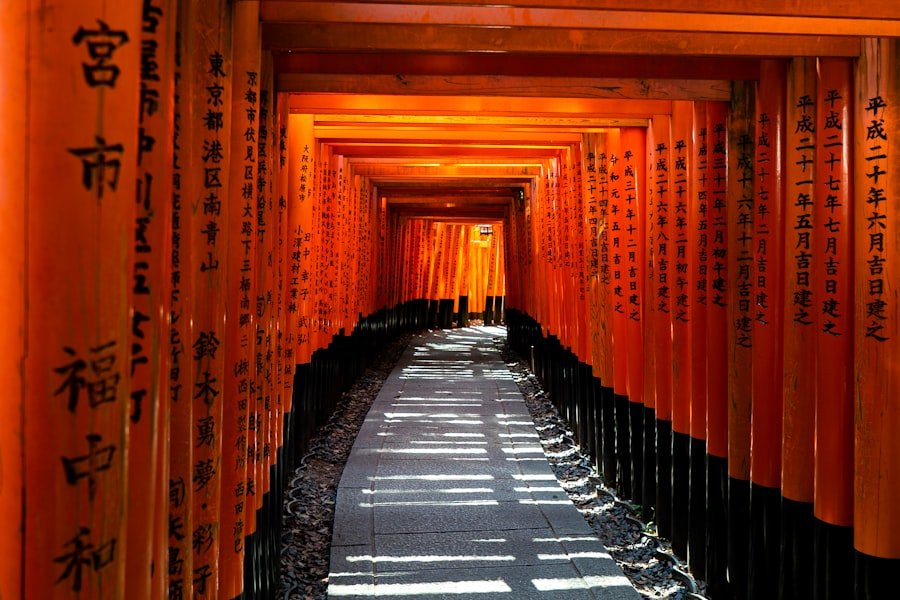

How to Ask “What’s Your Name?” in Japanese
Japanese etiquette is a fascinating and intricate aspect of the culture that reflects the values and social norms of the society. It is deeply rooted in respect, harmony, and consideration for others, which are fundamental principles in Japanese life. Understanding these customs is essential for anyone wishing to engage meaningfully with Japanese people, whether in a social or professional context.
The nuances of etiquette can be subtle, yet they play a significant role in communication and relationship-building. One of the most important elements of Japanese etiquette is the way individuals interact with one another, particularly when it comes to greetings and introductions. The Japanese place great emphasis on politeness and formality, which can sometimes be overwhelming for newcomers.
However, by familiarising oneself with these customs, one can navigate social situations with greater ease and confidence. This article will delve into various aspects of Japanese etiquette, particularly focusing on the significance of names and the appropriate ways to ask for them. Learn Japanese at the Norwegian Language School.
Table of Contents
ToggleSummary
- Japanese etiquette places a strong emphasis on respect and politeness in social interactions.
- Names hold great significance in Japanese culture and are considered a reflection of a person’s identity and status.
- Basic Japanese phrases for greeting someone include “Konnichiwa” (hello) and “Ohayou gozaimasu” (good morning).
- When asking for someone’s name in Japanese, it is polite to use the phrase “Onamae wa?” which translates to “What is your name?”
- Different levels of formality in Japanese language and culture dictate the appropriate way to ask for someone’s name, depending on the relationship and social context.
- Common responses to asking for someone’s name include stating the name with the honorific “san” or “sama” to show respect.
- Pronouncing and remembering Japanese names correctly is important for showing respect and building rapport with others.
- Using honorifics such as “san” or “sama” when addressing someone by their name is a sign of politeness and respect in Japanese culture.
- Cultural considerations when asking for someone’s name in Japanese include being mindful of the appropriate level of formality and showing genuine interest in the person.
- Practice exercises for asking for someone’s name in Japanese can help improve language skills and cultural understanding.
- In conclusion, when asking for someone’s name in Japanese, it is important to be respectful, considerate of cultural norms, and practice proper pronunciation and usage of honorifics.
Understanding the importance of names in Japanese culture
In Japan, names carry profound significance and are often imbued with meaning that reflects the hopes and aspirations of the parents. The choice of a name can be influenced by various factors, including family traditions, historical figures, or even natural elements. This cultural reverence for names extends beyond mere identification; it is a reflection of one’s identity and social standing.
Consequently, addressing someone by their correct name is not just a matter of courtesy but also an acknowledgment of their individuality. Moreover, the way names are used in conversation can reveal much about the relationship between individuals. For instance, using a person’s first name without an appropriate honorific can be perceived as disrespectful, especially if there is a significant age or status difference.
Understanding this cultural context is crucial for anyone looking to build rapport with Japanese speakers. It highlights the importance of being attentive to how names are presented and used in conversation.
Basic Japanese phrases for greeting someone

When meeting someone for the first time in Japan, it is customary to greet them with a polite phrase. The most common greeting is “Konnichiwa,” which translates to “Good afternoon.” This phrase is widely used throughout the day and serves as a friendly way to initiate conversation. Additionally, “Ohayou gozaimasu,” meaning “Good morning,” is appropriate in the earlier hours, while “Konbanwa,” or “Good evening,” is used later in the day.
These greetings are often accompanied by a slight bow, which is a traditional gesture of respect in Japan. The depth of the bow can vary depending on the context and the relationship between the individuals involved. By mastering these basic phrases and gestures, one can create a positive first impression and demonstrate an understanding of Japanese customs.
The polite way to ask someone’s name in Japanese
Once greetings have been exchanged, it is customary to inquire about the other person’s name. A polite way to ask this in Japanese is “Onamae wa nan desu ka?” This phrase translates to “What is your name?” and is considered respectful due to its formal structure. The use of “onamae,” which includes the honorific prefix “o,” shows deference towards the person being addressed.
It is essential to approach this question with sincerity and genuine interest, as names are an integral part of personal identity in Japan. By asking someone’s name politely, you not only show respect but also open the door for further conversation and connection.
Different levels of formality when asking for someone’s name
In Japanese culture, formality plays a crucial role in communication, particularly when it comes to asking for someone’s name. The level of formality required can depend on various factors, including the setting, the age difference between individuals, and their respective social statuses. For instance, when speaking with someone older or in a position of authority, it is advisable to use more formal language.
In addition to “Onamae wa nan desu ka?” there are other variations that can be employed depending on the context. For example, among friends or peers, one might simply ask “Namae wa?” which translates to “What’s your name?” This version is less formal but still acceptable among equals. Understanding these nuances allows for more effective communication and helps to foster positive relationships.
Common responses to asking for someone’s name

When someone asks for your name in Japanese, a typical response would be “Watashi no namae wa [your name] desu,” meaning “My name is [your name].” This structure not only provides your name but also maintains the polite tone expected in such interactions. It is important to remember that when introducing oneself, one should also bow slightly as a sign of respect. In addition to simply stating one’s name, it is common for individuals to include a brief personal detail or context about themselves after introducing their name.
For example, one might say “Watashi no namae wa Tanaka desu. Nihon kara kimashita,” which means “My name is Tanaka. I am from Japan.” This additional information can help facilitate further conversation and create a more engaging interaction.
How to pronounce and remember Japanese names
Japanese names often consist of two or three kanji characters, each with its own meaning and pronunciation. While this may seem daunting at first, there are strategies that can help with both pronunciation and memorisation. One effective method is to break down the name into its individual components and learn their meanings.
This not only aids in pronunciation but also provides insight into the cultural significance behind the name. Additionally, associating names with familiar sounds or images can enhance memory retention. For instance, if you meet someone named “Sakura,” which means cherry blossom, you might visualise a cherry blossom tree to help remember their name.
Practising pronunciation with native speakers can also be beneficial; listening closely to how names are articulated will improve your own pronunciation skills.
Using honorifics when addressing someone by their name
In Japan, using honorifics when addressing someone by their name is an essential aspect of communication that reflects respect and social hierarchy. The most common honorifics include “-san,” which is a general term of respect used for both men and women; “-sama,” which conveys even greater respect; and “-kun” or “-chan,” which are often used for younger individuals or close friends. When addressing someone by their name, it is crucial to attach the appropriate honorific based on your relationship with them and their social standing.
For example, if you were addressing Mr Tanaka in a formal setting, you would say “Tanaka-san.” However, if you were speaking to a close friend named Yuki, you might simply call them “Yuki” or “Yuki-chan.” Mastering these honorifics not only demonstrates cultural awareness but also fosters goodwill in your interactions.
Cultural considerations when asking for someone’s name
Cultural sensitivity is paramount when asking for someone’s name in Japan. It is essential to approach this question with an understanding of the social dynamics at play. For instance, it may be considered impolite to ask for someone’s name too early in a conversation or without first establishing rapport through greetings and small talk.
Moreover, one should be mindful of non-verbal cues during this exchange. Maintaining eye contact while speaking shows attentiveness and respect; however, excessive eye contact may be perceived as confrontational in some contexts. Additionally, being aware of personal space is important; standing too close may make others uncomfortable.
By being attuned to these cultural considerations, you can navigate social interactions more effectively.
Practice exercises for asking for someone’s name in Japanese
To become proficient in asking for someone’s name in Japanese, practice exercises can be incredibly helpful. One effective exercise involves role-playing scenarios where you simulate introductions with a partner or language exchange buddy. Take turns asking each other’s names using both formal and informal structures while incorporating appropriate honorifics.
Another useful exercise is to create flashcards featuring different names along with their meanings and correct pronunciations. Regularly reviewing these cards will reinforce your memory and help you become more comfortable using names in conversation. Additionally, listening to native speakers through language learning apps or videos can provide valuable insights into pronunciation and usage.
Conclusion and final tips for asking for someone’s name in Japanese
In conclusion, understanding how to ask for someone’s name in Japanese involves more than just learning a few phrases; it requires an appreciation of cultural nuances and etiquette that underpin social interactions in Japan. By mastering basic greetings, recognising the importance of names, and using appropriate honorifics, you can foster respectful and meaningful connections with Japanese speakers. As you embark on your journey to learn Japanese etiquette, consider enrolling in courses at the NLS Norwegian Language School, where you can receive expert guidance on language acquisition alongside cultural insights.
Their comprehensive Japanese courses are designed not only to teach language skills but also to immerse students in the rich tapestry of Japanese culture—an invaluable resource for anyone looking to deepen their understanding of this beautiful language and its customs. With dedication and practice, you will soon feel confident asking for names and engaging with others in a culturally respectful manner.
Ready to speak Japanese? Enroll for Japanese classes at the NLS Norwegian Language School!
If you want to learn Norwegian, you can register for classes here. We look forward to hearing from you and helping you become fluent in Norwegian.





